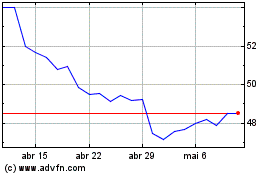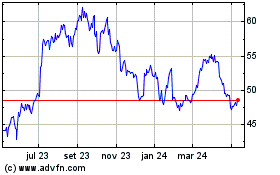Reserve Oil to Ease Prices? - Analyst Blog
24 Junho 2011 - 12:53PM
Zacks
In a surprise move, U.S. and its allies in the Paris-based
International Energy Agency (“IEA”) – the energy-monitoring body of
28 industrialized countries – have announced the release of 60
million barrels of emergency crude supplies from government-held
strategic reserves into the world market over the next 30 days.
Of the total volume, half (or 30 million barrels) will come from
the U.S. Strategic Petroleum Reserve (“SPR”) – the largest release
ever from the nation’s huge 727 million barrel emergency stockpile
– with Europe accounting for 30% and the Pacific OECD nations
supplying the remainder.
As per the plan, IEA, which represents the bulk of the world's
largest energy consuming nations, will release 2 million barrels a
day starting next week and stretching over a month, mainly to
alleviate the loss of crude exports created by the unrest in Libya
and other oil-rich nations in the Middle East.
In particular, the U.S. and IEA officials point out that
turbulence in Libya has taken off 140 million barrels from the
market year-to-date, most of that being high-quality oil that is
easiest to refine and convert to gasoline. This, they say, have
raised prices and slowed the economic recovery in the U.S. and
abroad.
The proponents of the move argue that, if successful, it could
bring down the price of fuel and jolt the stalling recovery by
acting as a type of economic stimulus through increased consumer
spending that has seen pressure for much of this year with crude
prices jumping above $110 a barrel.
The emergency crude supply release comes with the onset of the
summer driving season, usually the period of peak petroleum
consumption and one in which high-quality crude oil like Libya's is
particularly in demand.
Additionally, the administration's action is aimed at countering
the Organization of the Petroleum Exporting Countries’ (OPEC)
refusal to boost its production quotas and apprehensions regarding
a new surge in gas prices.
However, some analysts are skeptical about the impact of the
oil-reserve release on prices, arguing that it is most likely to be
short-lived. They went on to say that the 60 million barrel
drawdown amounts to less than one day of global oil demand,
currently close to 87 million barrels per day.
With commercial crude supply levels in the U.S. already above
the upper limit of the average for this time of the year and oil
prices headed lower due to economic weakness in the world's biggest
oil consumer, the proposed move will do little to benefit
consumers, stressed these analysts.
But, unsurprisingly, the announcement that the consuming nations
would tap emergency reserves drove down crude oil prices by nearly
5% to around $91 per barrel, a four-month low. As a result, the
share prices of oil-weighted majors like ExxonMobil
Corp. (XOM), Chevron Corp (CVX), and
Schlumberger Ltd. (SLB) also tumbled.
CHEVRON CORP (CVX): Free Stock Analysis Report
SCHLUMBERGER LT (SLB): Free Stock Analysis Report
EXXON MOBIL CRP (XOM): Free Stock Analysis Report
Zacks Investment Research
Schlumberger (NYSE:SLB)
Gráfico Histórico do Ativo
De Jun 2024 até Jul 2024

Schlumberger (NYSE:SLB)
Gráfico Histórico do Ativo
De Jul 2023 até Jul 2024
